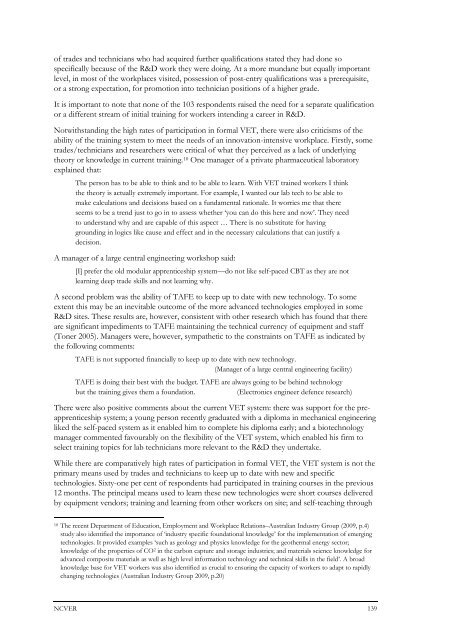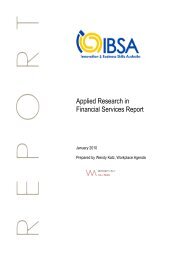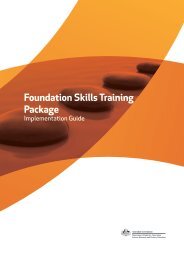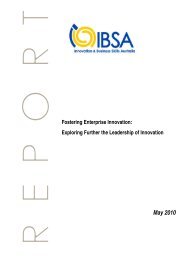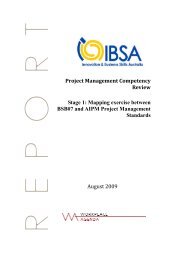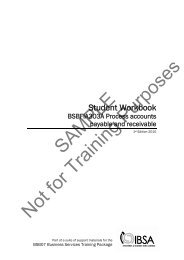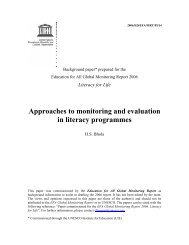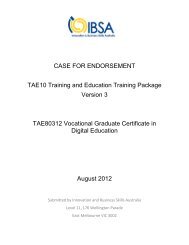NATIONAL CENTRE FOR VOCATIONAL EDUCATION RESEARCH ...
NATIONAL CENTRE FOR VOCATIONAL EDUCATION RESEARCH ...
NATIONAL CENTRE FOR VOCATIONAL EDUCATION RESEARCH ...
You also want an ePaper? Increase the reach of your titles
YUMPU automatically turns print PDFs into web optimized ePapers that Google loves.
of trades and technicians who had acquired further qualifications stated they had done sospecifically because of the R&D work they were doing. At a more mundane but equally importantlevel, in most of the workplaces visited, possession of post-entry qualifications was a prerequisite,or a strong expectation, for promotion into technician positions of a higher grade.It is important to note that none of the 103 respondents raised the need for a separate qualificationor a different stream of initial training for workers intending a career in R&D.Notwithstanding the high rates of participation in formal VET, there were also criticisms of theability of the training system to meet the needs of an innovation-intensive workplace. Firstly, sometrades/technicians and researchers were critical of what they perceived as a lack of underlyingtheory or knowledge in current training. 10 One manager of a private pharmaceutical laboratoryexplained that:The person has to be able to think and to be able to learn. With VET trained workers I thinkthe theory is actually extremely important. For example, I wanted our lab tech to be able tomake calculations and decisions based on a fundamental rationale. It worries me that thereseems to be a trend just to go in to assess whether ‘you can do this here and now’. They needto understand why and are capable of this aspect … There is no substitute for havinggrounding in logics like cause and effect and in the necessary calculations that can justify adecision.A manager of a large central engineering workshop said:[I] prefer the old modular apprenticeship system—do not like self-paced CBT as they are notlearning deep trade skills and not learning why.A second problem was the ability of TAFE to keep up to date with new technology. To someextent this may be an inevitable outcome of the more advanced technologies employed in someR&D sites. These results are, however, consistent with other research which has found that thereare significant impediments to TAFE maintaining the technical currency of equipment and staff(Toner 2005). Managers were, however, sympathetic to the constraints on TAFE as indicated bythe following comments:TAFE is not supported financially to keep up to date with new technology.(Manager of a large central engineering facility)TAFE is doing their best with the budget. TAFE are always going to be behind technologybut the training gives them a foundation.(Electronics engineer defence research)There were also positive comments about the current VET system: there was support for the preapprenticeshipsystem; a young person recently graduated with a diploma in mechanical engineeringliked the self-paced system as it enabled him to complete his diploma early; and a biotechnologymanager commented favourably on the flexibility of the VET system, which enabled his firm toselect training topics for lab technicians more relevant to the R&D they undertake.While there are comparatively high rates of participation in formal VET, the VET system is not theprimary means used by trades and technicians to keep up to date with new and specifictechnologies. Sixty-one per cent of respondents had participated in training courses in the previous12 months. The principal means used to learn these new technologies were short courses deliveredby equipment vendors; training and learning from other workers on site; and self-teaching through10 The recent Department of Education, Employment and Workplace Relations–Australian Industry Group (2009, p.4)study also identified the importance of ‘industry specific foundational knowledge’ for the implementation of emergingtechnologies. It provided examples ‘such as geology and physics knowledge for the geothermal energy sector;knowledge of the properties of CO 2 in the carbon capture and storage industries; and materials science knowledge foradvanced composite materials as well as high level information technology and technical skills in the field’. A broadknowledge base for VET workers was also identified as crucial to ensuring the capacity of workers to adapt to rapidlychanging technologies (Australian Industry Group 2009, p.20)NCVER 139


